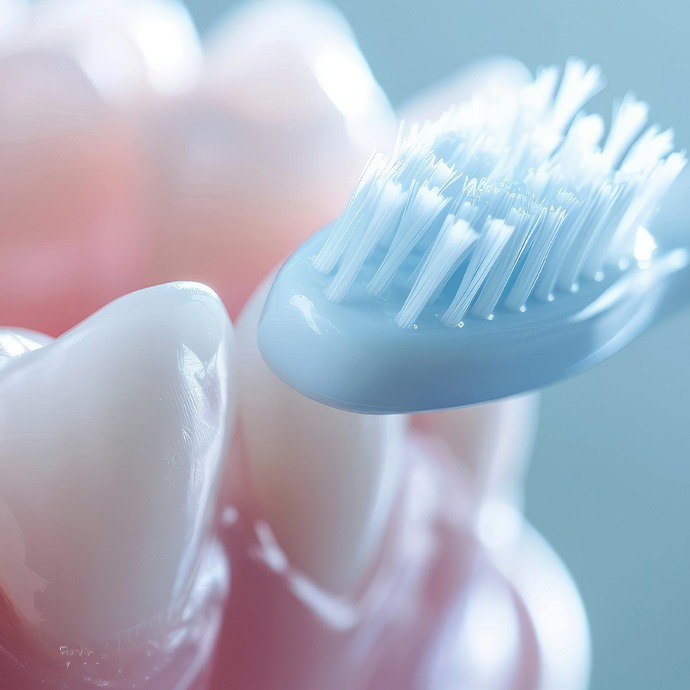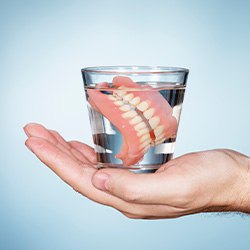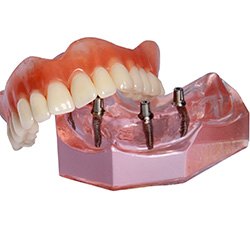Dentures – Longmont, CO
Restore Your Smile After Major Tooth Loss
Dentures have been around for centuries, but that doesn’t mean they haven’t improved since then. In fact, modern dentures are more natural-looking than ever, especially when paired with dental implants. Keep in mind that just because you are missing all your teeth in one or both arches does not necessarily mean that you have to suffer in silence. Our highly personalized prosthetics at Coats Dental Group of Longmont are designed to not only look natural, but drastically improve your quality of life. Give us a call today to find out which denture can best suit your needs!
Who’s a Good Candidate for Dentures?

Truthfully, qualifying for dentures isn’t that difficult. Most patients with tooth loss make for good candidates. That said, it’s still a good idea to consult our dentists on the matter. They can assess your smile and confirm if dentures are right for you. If they aren’t, though, don’t worry – alternative procedures are available. (You can even become a candidate later via preliminary dental work.) If you want further details, just keep reading or call our office.
Effects of Missing Teeth

As you consider dentures, reviewing tooth loss’s causes and effects is helpful. Knowing these factors emphasizes how dentures protect oral health.
In general, a person might lose teeth for various reasons. Maybe their tooth decays to the point it falls out or needs extraction. Conversely, a patient might get gum disease that wears down the tissues supporting their teeth. Someone could also have their pearly whites knocked out by an accident or injury.
Meanwhile, tooth loss effects are almost always drastic. The most notable outcome is that it makes everyday tasks much harder – eating, speaking, smiling, etc. Its untreated smile gaps also slowly erode your jaw over time. (This process can trigger a facial collapse.) Worse, those spaces could trigger your other teeth to tilt and fall out.
What Qualifies You for Dentures?

Indeed, tooth loss is the main qualifying factor for denture candidates. However, there are other ones worth considering as well.
For example, look at your general oral health. Dentures only work correctly if your gums and jaws are sufficiently healthy. (The restorations will lack support otherwise.) All the same, decayed or sensitive teeth won’t disqualify you; dentures can be a suitable way to replace them.
How many teeth you’re missing is another concern. After all, the number will determine the denture model you receive. The first is a partial type that only replaces a few teeth. Meanwhile, the second is a full denture that replaces all pearly whites along an arch.
You’d even be wise to account for your finances. As it turns out, dentures cost less than other restorations. That means they’re ideal for patients on small budgets.
Alternative Tooth-Replacement Options

If you aren’t a good dentures candidate, don’t worry; you still have many options. Our office happens to provide several other tooth replacement services. Among these offerings, the most common ones are:
- Dental Bridges – A dental bridge is a fixed restoration. Made of dental crowns fused to a pontic, it clasps onto nearby teeth for security and support. This choice is thus best for replacing a few teeth at a time.
- Dental Implants – Dental implants are titanium screws placed in your jawbone. By slowly fusing with your jaw, they act as replacement tooth roots that don’t slip or fall. Given such high-end features, though, implants are more expensive than other restorations.
Types of Dentures

The best way to confirm which denture is right for you is to speak with our dentists directly, but in the meantime you can explore our services below to get a better understanding of your options. They include partial, full, and implant dentures, all of which hold a specific purpose depending on your needs and preferences.
Partial Dentures
When you have large gaps in between your teeth on opposite sides of your mouth, chewing food becomes extremely difficult. To fill those gaps, a partial denture can be created. This prosthetic is designed to fit inside the mouth like a puzzle piece using metal hooks that wrap around existing teeth. Gum-colored sections ensure the denture blends in with your existing gum tissue.
Full Dentures
If you are missing all your teeth in either your top, bottom, or both arches, a full denture can replace your smile in an incredibly comprehensive way. The denture is made entirely of tooth-colored materials, including gum-colored acrylic resin and ceramic teeth. That way, it blends in easily with your neighboring oral structures. It remains in place through natural suction of the gums and is designed with your exact mouth shape in mind.
Implant Dentures
Want a more permanent solution for your severe tooth loss? Implant dentures combine the reliability and longevity of dental implants with a custom-made prosthetic that looks indistinguishable from natural teeth. Rather than relying on existing teeth or natural suction to the gums for support, the denture attaches to dental implants surgically placed inside the jaw. If you aren’t happy with traditional dentures, you’ll find implant dentures to be a major upgrade.
How Dentures are Made

If you’ve decided to invest in a beautiful new set of dentures, you’re probably wondering how they will be made. Each set of dentures from Coats Dental Group of Longmont is customized to the patient’s needs using high-quality materials to create a comfortable and lifelike restoration. Here’s a quick guide to how dentures are manufactured, but please feel free to contact our staff if you have any questions.
What are Dentures Made Of?

Dentures consist of two parts, those being the base and the teeth. Here’s a brief overview of these components.
- The base of a denture serves as the foundation that allows your appliance to reliably and firmly hold its position in your mouth. A denture base can be made from materials such as acrylic, nylon, resin, metal, or porcelain. We usually make full dentures using acrylic since it is easier to match to natural gum tissue, and a partial denture usually includes metal clips as part of the acrylic base.
- The artificial teeth of a denture are typically made from porcelain to give them strength and a natural appearance. However, porcelain can be abrasive to neighboring teeth, so we usually only recommend them for full dentures.
The Denture Creation Process

Each denture is customized to fit the patient’s mouth using a multi-step process that includes:
Step 1: We accurately measure your gums and remaining teeth using bite impressions, and we may also measure your jaw. This data allows us to ensure that your denture will fit properly.
Step 2: The impressions are sent to a dental laboratory where a skilled technician will craft a wax replica of your gumline.
Step 3: The technician will use a machine called an articulator to attach the artificial teeth to the wax replica and make minor adjustments as needed.
Step 4: These wax dentures arrive at our office for fitting. You’ll come in to try them on, and, if you approve them, they will be sent back to the dental lab.
Step 5: Back at the lab, the technician will boil your dentures in a flask to remove the wax.
Step 6: Acrylic is placed into the flask to fill in the spaces once occupied by wax.
Step 7: The flask is removed to reveal the denture, which is then placed in an ultrasonic bath to eliminate any lingering plaster.
Step 8: The dentures will be trimmed and polished.
Step 9: You will return to the office to try your new dentures on. After any final adjustments, you’ll be ready to meet the world with your new smile.
Adjusting to Your New Dentures

You may experience some discomfort when you first start wearing dentures. This may include mild soreness and difficulty chewing and speaking, but these will diminish over the coming days as your mouth gets used to your new appliance. You can minimize these issues by sticking to a soft diet and exercising your facial muscles during this period. If your discomfort continues after a few days or seems to be getting worse, please contact us so we can address the problem.
The Benefits of Dentures

Dentures are highly personalized so they match the overall shape of your mouth as closely as possible. Since they are made to look like natural teeth, you can smile with confidence, enjoy more of the foods you love, and express yourself to the fullest without worry. Not only do you get your smile back, but you can keep your cheeks from appearing hollow, improving your overall facial appearance. Cleaning and maintaining your denture is a relatively simple process as well. Here are some of the various benefits you can expect to appreciate with these custom prosthetics.
Psychological Benefits

Having some missing teeth or all of your teeth gone can be detrimental to both your oral health and your overall quality of life. Most people struggling with tooth loss can end up experiencing feelings of sadness and depression due to significantly reduced self-esteem. By restoring your smile with dentures, you can boost your confidence while minimizing any anxieties about your appearance, chewing, speech, and more.
Clearer Enunciation

Leaving a gap in your smile not only potentially increases the risk of bacteria and gum disease, but can also affect the way you speak. This is because we use our tongues and lips to press them against our teeth to enunciate certain words and sounds. Dentures are versatile and can easily be made to complete your smile, that way you can return to speaking comfortably and confidently.
Improves Nutrition

Some foods can be tough to chew, especially if you’re missing some or all of your teeth. If left unaddressed, you can end up developing certain issues with your eating habits, such as malnutrition and indigestion. With dentures, you’ll be able to regain the majority of your bite, which can also help expand your dietary choices to include more vitamin-rich options, such as fruits, veggies, dairy products, and lean meats.
Preserves Oral Health

Dentures can generally help any other remaining teeth in your mouth stay in place, as they can typically move to fill any gaps after tooth loss. Not only does this prevent dental shifting, but your prosthetics can also help distribute pressure evenly throughout your mouth. This means you’ll be less likely to experience excessive wear and tear on your natural teeth, allowing you to maximize their longevity.
Expands Opportunities

Did you know a complete smile can often make a great first impression? In many cases, people end up perceiving others as more confident, outgoing, competent, and attractive if they have a full set of pearly whites. By replacing missing teeth with dentures, you can end up expanding your opportunities in both your social and professional life.
Understanding the Cost of Dentures

Are you unsure of what to expect from the cost of dentures in Cottonwood Heights? Our team at White Peak Dental believes you should be able to restore your smile without stressing over the financial pressure that it typically entails, which is why we’re happy to offer several different payment methods and discounts through our in-house membership plan. Take advantage of restoring your smile with a trustworthy, skilled dental team today by scheduling a consultation to get a detailed cost estimate for dentures.
Factors That Can Affect the Cost of Dentures

There’s no set cost of dentures because there are multiple factors that play into determining the price of treatment. Some of these include:
- How many teeth you’re missing
- Whether you require preparatory procedures like tooth extractions
- If you decide to receive dental implants
- What materials your dentures are crafted from
We’ll discuss each of these details with you during your initial consultation, along with how they can impact the overall cost of your treatment.
Are Implant Dentures More Expensive?

While it’s true that implant dentures have a higher up-front cost, they also offer an array of unique, priceless benefits that make them one of the most popular solutions for tooth loss among patients. One of these being that they have a lifespan of up to 35 years. This means that they can last over three times longer than traditional dentures, making them a more cost-effective solution in the long run.
The best way to learn whether implant dentures in Cottonwood Heights are right for you is to schedule a consultation with Dr. Hanson. He’ll let you know if you’re a good candidate for the procedure and outline the cost with you so you can see whether it would be the better investment for your oral health and overall quality of life.
Does Dental Insurance Cover Dentures?

Typically, dental insurance plans do cover a portion of the cost of dentures. However, it’s worthwhile to note that every plan is different, and to find out, you’ll need to contact your provider directly to ask. Our team at White Peak Dental is happy to be in-network with most major PPO dental insurance plans, and if we aren’t in-network with yours, know that we’ll be happy to file a claim on your behalf to help you maximize your benefits.
Ways to Make Dentures More Affordable

In addition to accepting most dental insurance plans, we’re proud to make dentures from your dentist in Cottonwood Heights more affordable by offering a 30 percent discount through our in-house membership plan . At only $220 a year, this plan includes two basic cleanings and full exams, an oral cancer screening, all digital X-rays, and an emergency exam with X-rays every year, along with the discount mentioned above. It’s a great deal that eliminates the stress from taking care of your smile!
Dentures Aftercare

Your new dentures have the potential to fully transform the appearance and functionality of your smile. However, caring for them correctly is essential to continuing to reap the many benefits they provide. Even if you have no natural teeth remaining, it’s still important to maintain a consistent daily dental hygiene routine to keep your prosthetics and your oral health in good shape. You should also visit our team at Coats Dental Group once every six months for a routine checkup to prevent possible problems like gum disease.
Continue reading to learn more about how to preserve your restoration, and feel free to contact us for more information.
Removable Dentures

Remove After Eating
Your artificial teeth restore a great deal of your original chewing power, so you can enjoy a variety of foods that support your overall well-being. That said, they tend to trap little pieces of your meal, which attracts unwanted bacteria that can contribute to gum disease. To prevent this, we recommend removing your dentures and rinsing them under running water. Remember not to use hot temperatures that can warp the acrylic base, so it no longer fits.
Clean Your Restoration
In addition to clearing away debris after eating, you should remove your dentures twice daily to wash them thoroughly. To do so, use a soft-bristled toothbrush that won’t irritate their surface and scrub all surfaces thoroughly but gently with a mild dish soap or special cleanser. Remember, standard toothpaste can harm the material and should be avoided.
Then, if it’s evening and you’re heading to bed, place them in a glass of water or a soaking solution to eradicate germs while you sleep. Otherwise, rinse them off and reinsert them to go about your day!
Keep Your Dentures Safe
Your restoration can become quite slippery when it’s covered in soap and water and can sustain damage if it falls from a great height or with enough force. Placing a soft towel underneath you when you clean it ensures that it will have a soft cushion to land on if it takes a tumble.
Also, store them safely out of the reach of small children or pets who might mishandle them.
Remove Dentures When You Sleep
Some patients wonder if it’s okay to sleep with their dentures in their mouths, but we don’t recommend it. They press against your gums all day, restricting circulation and irritating the tender tissue if they never get a reprieve. Furthermore, people tend to produce less saliva while they’re snoozing, allowing bacteria to proliferate. This increases the likelihood of plaque residue and gum disease.
Taking your prosthetics out to let them soak overnight gives your mouth a break to heal so you can better resist potential oral issues.
Notice Changes
Paying attention to what’s happening with your teeth and gums allows you to spot changes that might point to an underlying concern that needs to be addressed. For instance, if you notice that your gums appear darker or more swollen than usual, you may be developing gingivitis and should contact us.
Also, if you see a chip, crack, or other type of break in your dentures, don’t try to fix it at home. Many patients have found themselves in the middle of a dental emergency because they tried repairing their prosthetics with household items that can be toxic, like super glue. Instead, let us know what happened so we can help repair or replace your dentures as needed.
All-on-4 Dentures

These implant dentures are permanently anchored in place, so the care instructions are somewhat simpler. You should brush them twice daily with a soft-bristled toothbrush and non-abrasive toothpaste. Avoid any products containing baking soda or other stain-removing agents because they won’t be effective and might damage the material of your artificial teeth.
Once that’s complete, floss them to remove any plaque or food particles to keep them fresh. If you struggle with getting the string between the pontics, try a special floss threader or a water flosser instead. Then, rinse your mouth with an antibacterial wash, and you’re all set!
Denture FAQs

Losing several teeth is hardly an easy experience, which is why it’s understandable if you have questions about treatment or how it works. No matter how severe your tooth loss may be, our team at Coats Dental Group of Longmont has just about heard it all. Below, you can find some of the most common questions our office has addressed over the years. Don’t be afraid to ask us any questions, however, if yours is not mentioned!
Should I Have All My Teeth Pulled to Get Dentures?
When a tooth is damaged, we’d prefer to exhaust all options to repair it over replacing it outright. We will only extract teeth if we believe it is absolutely necessary. For example, if it is too damaged due to decay, infection, or injury, we’ll remove it. If all the teeth in a given arch are damaged by gum disease, it could be more cost-effective to extract them first, then place the denture, rather than cover them with crowns. There is no hard and fast limit on how many teeth can be extracted in a single visit, but keep in mind certain extractions can be more difficult than others. Our dentists will explore all your options before recommending extractions, period.
Will It Hurt to Get Dentures?
Should you need to have teeth extracted before receiving a denture, you can expect some mild discomfort following your surgery after the anesthetic wears off. Thankfully, this is relatively easy to mitigate with prescription pain medication taken over the next three to five days. After you receive your new denture, it’s common to experience some mild irritation as you adjust to wearing the appliance. The amount of time this discomfort lasts can vary, but it typically goes away after a few weeks or months. It could take longer if you are switching from an old denture to a new one. If pain does not improve, call our office right away as there could be an underlying issue that needs attention.
How Much Does It Cost to Have Your Teeth Pulled and Get Dentures?
Costs of tooth extractions really depend on how many teeth are left in your arch. Additionally, the type of teeth being extracted (i.e. simple vs surgical) can impact costs. Surgical extractions are more expensive to complete on average because they take more time and precision to perform. Only full dentures require all teeth to be removed, while partial dentures do not. Your costs also go up if you intend to pair your denture with dental implants. The ultimate cost estimate of your tooth replacement will be determined once we have a chance to examine your mouth and determine your treatment options.
Will Dentures Change the Shape of My Face?
After you lose your teeth, your facial muscles will start to sag. This can give your face a more sunken appearance. By getting dentures, you give your facial muscles added support as they start to collapse. If your dentures do not fit properly, they won’t give your face the support it needs. That’s why we always design each denture to fit your mouth as closely as possible. If yours does not fit properly, we recommend visiting us to see if a reline or replacement is needed.
I Need a Checkup & Cleaning I Have a Cavity or Broken Tooth I am Missing One or More Teeth I Need a Dentist for My Child I am Worried About Bleeding Gums I Want to Enhance My Smile I am Afraid/Nervous of the Dentist I am in Pain & Need Help I Need Sleep Apnea Treatment View Our Services
